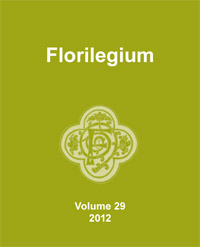"As olde bookes maken us memorie": Chaucer and the Clerical Commentary Tradition
Abstract
The clerical exegesis within Chaucer's Canterbury Tales has frequently been connected to medieval ethical commentary traditions. This paper challenges that idea with new manuscript evidence from paraphrases of Ovid's Metamorphoses, which would have taught Chaucer how to read and write. The article argues for a re-evaluation of Chaucer's relationship to the clerical milieu that inspired his characterization of the Monk, the Wife of Bath and her husband Jankyn, the Summoner, and the Summoner's friar. The ways in which these characters adapt and comment on hermeneutics elucidate both the means by which lay readers accessed clerical discourse and the patterns of reading and textual analysis that inspired the composition of parts of the Canterbury Tales.Downloads
Published
2012-05-01
How to Cite
Gerber, A. J. (2012). "As olde bookes maken us memorie": Chaucer and the Clerical Commentary Tradition. Florilegium, 29, 171–200. Retrieved from https://journals.lib.unb.ca/index.php/flor/article/view/21927
Issue
Section
Articles



